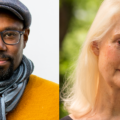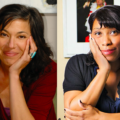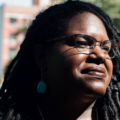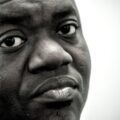Conversations: Femi Osofisan and ‘Jide Ajidahun

Femi Osofisan is an indomitable, resilient, irrepressible, cerebral and indefatigable Nigerian playwright, a titanic dramatist of monumental proportion, a literary giant, a poet, an international scholar of repute, a critic, a journalist, a producer, a director and an essayist.
To date, Osofisan has published well over fifty plays, five novellas, short stories and several collections of poetry. His Marxist ideological leaning has also made the playwright a ferocious social crusader who deploys the platform of the theatre to defend the downtrodden. His revulsion and disgust for graft and corruption, oppression, and injustice in the Nigerian society is indescribable and tremendous. Osofisan speaks with stridency. His images are biting. His language is accessible, and his theatre is popular.
The Western influences on Osofisan’s theatre are brilliantly domesticated to complement his rich evocation and exploitation of traditional folkloric devices, and his revolutionary reconstructions of history, myth, legend, songs and parables. Osofisan’s depiction of women as heroes and as agents of social change has also contributed significantly to the advancement of black feminism in Africa.
This interview touches upon the playwright’s humble beginning, his family, his voracious passion for justice, his vision for the African continent, as well as his frustrations and motivations as a writer and as a critic.
‘Jide Ajidahun: In a 1987 article for The Guardian, you write about losing your father when you were two months’ old. “Some like me are born straight into the embrace of grief… As some are born into wealth.”
This sounds to me like a statement about fate, and I’m curious: do you believe in fate, or in predestination? Isn’t this a contradiction against the revolutionary ideas in your plays? In Another Raft, for instance, you write that destiny is in our hands. I also wonder how the loss of your father at such a young age affected your upbringing and ideology?
Femi Osofisan: You are asking so many questions at the same time! In Yoruba philosophy, destiny is not immutable. It is not that you just sit down and do nothing. You can change it, or at least try, through a number of actions.
Talking of how one was born into grief, it seems to suggest a kind of predestination. But is a fact that moments of grief will always come in one’s life. Having been born into a poor family and losing the father, the bread-winner, you know how difficult that means for a child in this type of country.
So, you are conscious of that whether you like it or not. Some people are not born into that kind of circumstance. Some are born with a silver spoon in their mouth. But as I said, there is destiny alright, but you have been given the freedom to act upon that destiny to change it if you wish.
JA: How has that struggle affected you, especially in your dramatic works?
FO: Well, I’m always conscious of poor people. Conscious of poverty. Conscious of the poor suffering because that is where I came from, the underprivileged in the society. I always try to speak up for them because I am part of them. I can’t help it.
JA: In another article in The Guardian, you refer to a car accident in which you were involved, and you write, “How stupid it would have been to die like that, with so much still to be done? With the obligations still to be fulfilled to one’s family and friends? With the message still unspoken, to the heart of one’s generation? Ben, I am alright now. And you’re right, there is no going yet.”
Would you say you are afraid of death? And have you succeeded in articulating that message unspoken for your generation? (I’m not by any stretch of the imagination saying it is now time to go!)
FO: I guess everybody is conscious of death. I’m not afraid of it. But to die in an accident is a stupid thing. If you died in a struggle like June 12 (the 1993 Nigerian Presidential Election), people were struggling for freedom and justice, then you know you were dying for a cause. People died for Biafra—that was for a cause. They were fighting a cause. If you die in the process of something you believe in, that is what I consider a meaningful death. But to die due to some carelessness, or because somebody else is careless and runs into you, is a waste.
And if you think you have a number of things to do and you go and lose your life like that, then it means, you haven’t fulfilled your mission. As for whether I have fulfilled my mission, you know, it’s like asking whether I’m ready to go. No!
The problem with violence is that once it starts, people get so enmeshed in it that they forget the actual things they are fighting for, and the violence becomes an end in itself.
JA: You have called on the government to ban visits of foreign preachers to Nigeria as a way of controlling religious conflicts in the country. “It is belief and compassion, and humility that lead to God not any particular doctrine.” Isn’t this call on the government to act against natural justice and fundamental human rights?
FO: In what sense is that a call against natural justice and fundamental human rights?
JA: Because, personally, I would think that everybody should have the right to travel and declare whatever he or she believes.
FO: Yes! Everybody should have the right. But do you think that if you are preaching Ifá, you have the same freedom like people who are preaching Christianity?
JA: People are doing it.
FO: But will you have the same freedom? Even if nobody attacks you, will they leave you alone?
JA: Nobody prevents the Ifá priests from preaching whatever they believe.
FO: Not that people don’t do it but do you know the controversy going on over Ikenga in Imo State? Do you know what Ikenga is?
JA: I don’t, sir.
FO: Ikenga is a sculptural symbol of the Igbo people. One was put on a round-about in Imo State. Suddenly a born again Governor just decided that you must remove this thing. Overnight he went and removed it and then he went and put a cross there—and this thing is generating a lot of controversy in Igbo land. Now people are saying that these Ikenga are spiritual symbols and other people are saying no, it’s idol worship.
You say people have freedom. They have no freedom. If you declare yourself an Ifa priest now, there are places you won’t get a job.
Look at the money being spent by Christians. All the money being spent from America. And what happens? Fanaticism. I was in Iseyin the other day and what happened? Muslim fundamentalists have matched the money and the fundamentalism. They wanted to kill the “Oro” priest of the town. If one of his children hadn’t been outside at the time, and seen them coming, they would have killed the priest and his family. They were shouting, “No more Oro worship in our town!”
They’ve always had Muslims in this town, in fact, and Christians—but suddenly, there is this new fanaticism.
You know Yoruba traditional belief is that every way leads to God. We don’t really care to discriminate, and we don’t legislate on it. It’s a matter of personal choice. But these other religions do care. They believe no other religions must exist except their own—and what happens?
JA: Have things changed for the better since you started your societal sanitization crusade? More than forty years after A Restless Run of Locusts (1975) was written, violence and thuggery continue to feature in our politics.
FO: I know that there are moments of despair. You get so discouraged at times.
But look! Look at all the people that were unjustly condemned, and were going to be killed, going to be executed and suddenly they are in the State House. They are now the ones making the law. And here we are in a democratic dispensation, the story has changed abruptly!
So, you see, you cannot lose hope.
Progress cannot be won without a struggle. Things won’t change without struggle. This time last year, nobody knew we could even be talking the way we are talking now in this country. Suddenly, it’s a new climate where everybody can express themselves.
Who knows? Maybe we will waste the opportunity again and then another military regime will start again. But the point is that well, fine, we will struggle again, we will continue to struggle. As long as poverty exists, people will continue to talk and agitate.
JA: Through your plays, you call for the total dismantling of the old order, but your own idea of revolution is a non-violent one. Is it really possible to have a revolution without violence?
FO: These are different questions. First, can we have revolution without violence? Yes of course, we can have a peaceful revolution. That is what I will prefer. But where it is not possible you will have to take to violence.
Sometimes you have to have the violence even to get yourself heard, because you can talk and nobody will notice. Ken Saro Wiwa was shouting for years and nobody listened, but when he became aggressive, the world noticed.
If violence becomes necessary, then violence cannot be helped. But, violence is not the goal, it’s not the end. You have to put that in the front of your consciousness. The problem with violence is that once it starts, people get so enmeshed in it that they forget the actual things they are fighting for, and the violence becomes an end in itself.
JA: Now that we’ve discussed the politics of your art, I want to turn to discuss them as art. Is there one or two plays for which you have the highest regard artistically?
FO: All of them! It’s like you have children and I ask you who is your favourite? They are all your children.
I think it depends on the mood I am in. The context. Sometimes it is not the play itself, it is the actors—the kind of people you work with.
I just finished directing Soyinka’s The Bacchae of Euripides, in the United States. I mean, this is a play. And maybe because there was a challenge and because we worked on it so much, suddenly it is an experience that none of us are going to forget. The actors are still writing to me. All the crew, the people involved. They say this is unprecedented. They can’t understand it. The cast say they are still hanging together. The choreographer, Folabo Ajayi Soyinka who was with me, we have worked together in other productions of my own plays and so on. But we both agree that this is the best play we’ve done together.
I mean, it depends. Sometimes a play that you don’t even appreciate that much, you just suddenly come to see it in another light, like my play Another Raft, which I like very much now. But there are other plays like that, to which I respond differently on different occasions.
JA: What are you planning to do in the near future? Do you have any work(s) in the pipeline?
FO: Yes of course! A writer, you know, is always working. Next month I will be in England assisting in a production of Once Upon Four Robbers. Then, when I come back, I will be working on my latest play, which is based on Bishop Ajayi Crowther.





